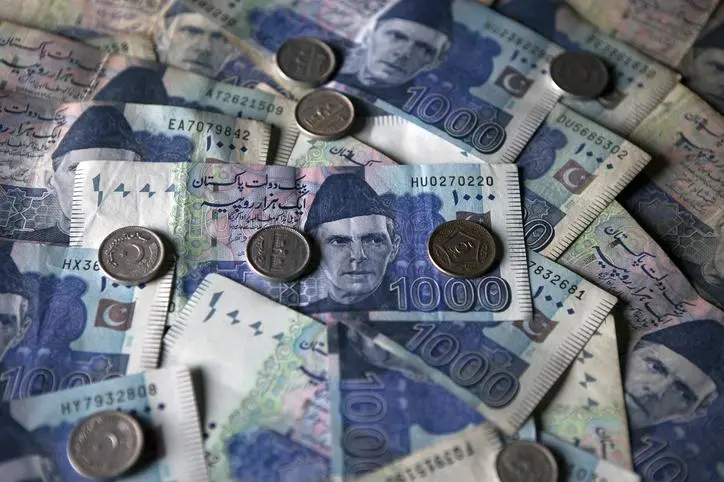PHOTO
Pakistan's Prime Minister Imran Khan received His Highness Sheikh Mohamed bin Zayed Al Nayhan, Crown Prince of Abu Dhabi and Deputy Supreme Commander of the UAE Armed Forces, at Islamabad's Nur Khan Airbase on Sunday before himself driving the dignitary to the Prime Minister's House.
Sheikh Mohamed was given a red carpet welcome on his first visit to Islamabad since 2007 before being welcomed with a 21-gun salute and a guard of honour.
At the PM House, the Abu Dhabi Crown Prince held a one-on-one meeting with PM Khan, then proceeded to lead the UAE delegation for comprehensive negotiations with the Pakistani side.
The visit confirms the UAE's support to Pakistan, allowing Khan's government to breathe a sigh of relief as it grapples with a Balance of Payments (BoP) crisis.
According to the Pakistani finance ministry, the two countries have finalised a $6.2 billion bailout package. It comprises $3.2 billion worth of oil supplies on deferred payment, on top of the $3 billion BoP support already announced late last year when Imran Khan visited the UAE.
Sheikh Mohamed and Imran explored various aspects of political, economic, investment and developmental relations and the possibility of enhancing them in multiple vital sectors, as well as intensifying coordination on new opportunities that serve the aspirations of the two countries.
Sheikh Mohamed affirmed his keenness to develop cooperation with Pakistan to serve the two countries' common interests.
"The UAE, under the leadership of the President, His Highness Sheikh Khalifa bin Zayed Al Nahyan, places great importance to strengthening its relations with Pakistan at various levels," he added.
Imran said that Sheikh Zayed has a special place in heart of every Pakistani and it will remain forever.
"There is much evidence of the support provided by Sheikh Zayed to Pakistan at all levels," he added, reiterating his appreciation for the recent financial support provided by the UAE to the State Bank of Pakistan. He emphasised the importance of this initiative, which reflects the depth of relations between both countries.
"Our two countries have historically enjoyed close and brotherly ties," Finance Minister Asad Omer told Khaleej Times. "This visit symbolises our common aspiration to deepen bilateral cooperation in all spheres, with special focus on the economy."
"This is going to help us in the immediate term because now we are close to meeting our external financing requirements for the current fiscal year (2018-19)," said Dr Hafiz Pasha, former finance minister.
The PTI government sees this package as a game changer which will allow it to shift focus from fire-fighting to enacting structural reforms in the economy. So far it has faced a series of political and financial crises since taking office in August.
These include suddenly high inflation, low growth, loss of investor confidence, unprecedented volatility in the currency and a collapse of the equity market.
"It is now essential for the government to use this breathing space to make necessary adjustments, particularly reduction of the current account deficit," added Dr Pasha.
With the current account deficit at $15 billion, and external debt repayment of $12 billion outstanding, Pakistan's external financing requirement for the outgoing fiscal stands at $27 billion.
And the UAE package, which has the same terms and conditions as recent Saudi help, will help the government save $7-8 billion in oil payments alone compared to last year.
"Oil accounts for more than 30 per cent of out total import bill and the deferred payments will help trim the oil and gas bill by approximately $8 billion," said Ehtesham Khan CMT, who is head of capital markets at Pak Brunei Investment Company and manages more than Rs2.5 billion in assets.
And since this 45-50 per cent saving in the oil bill comes at a time when Brent has collapsed 40 per cent in the international market since October, Pakistan "is looking at a discount of more than 60 per cent over last year."
The improved fiscal outlook will, finally, also enable the government to negotiate a favourable programme with the International Monetary Fund (IMF), besides providing much needed cushion to the rupee.
"Yes, IMF negotiations should proceed more smoothly now," said Ehtesham. "After all, it was uncertainty about the IMF that squeezed a good 12-13 per cent from the stock market since August."
The UAE Crown Prince's visit has not just helped stabilise Pakistan's economy, it has also vindicated the Pakistan Prime Minister's initiative of reaching out to friendly countries for urgent monetary support.
With reserves healthy and an IMF programme on the cards, the government expects investors to eye Pakistan's economy favourably in the next fiscal year.
Copyright © 2019 Khaleej Times. All Rights Reserved. Provided by SyndiGate Media Inc. (Syndigate.info).





















